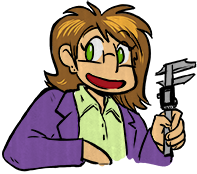Help a Fizzer Out!
It’s GUESTRAVAGANZA! This is a guest post by Sam Strasser. She’s a physicist, but engineers – he needs your help!
 Well, I may not be an engineer, but I am a senior undergrad physics major working on a neat thesis project. Hello all, my name is Sam Strasser, and this is my final year at Albion College, a small liberal-arts institution in Michigan. After spending the spring 2010 semester in Japan, I was actually planning on NOT doing a thesis. Most students here start their junior year (or earlier), and I missed that opportunity due to being abroad. However, I met with my advisor the first week of class and he told me that they had a small project I could make into a thesis…if I was willing to tackle it.
Well, I may not be an engineer, but I am a senior undergrad physics major working on a neat thesis project. Hello all, my name is Sam Strasser, and this is my final year at Albion College, a small liberal-arts institution in Michigan. After spending the spring 2010 semester in Japan, I was actually planning on NOT doing a thesis. Most students here start their junior year (or earlier), and I missed that opportunity due to being abroad. However, I met with my advisor the first week of class and he told me that they had a small project I could make into a thesis…if I was willing to tackle it.
On the roof of the physics building are 5 telescopes, one 14-inch (housed in a dome), one 11-inch, and three 10-inch mirrors. The department also has two CCD cameras that attach to the back of the telescopes. With the construction of the science complex atrium in 2007 (see pictures), 4 buildings are now connected. Convenient for travel, but also conducive to transmitting vibrations of all 4 buildings right into the telescopes. My project is this: accurately measure the vibrations in the telescopes (using LabVIEW and an accelerometer), then come up with ideas to mitigate the vibrations and hopefully implement them before graduation.
So far 3 students have worked on this problem in the past. Most of them got hung up around the programming 
It appears that the lateral vibrations are much greater in amplitude than the vertical vibrations. This is good news as it’s easier to fix the lateral vibrations with our current setup. However, we did see an inordinate amount of noise in the measurement, so we think that may be due to the DAQ device. The accelerometer is very sensitive; it’s calibrated at .33 volts per g, and it’s only picking up fractions of g’s. The noise that the DAQ device generates as it runs may be strong enough to interfere with the voltage coming in from the accelerometer. This is our next hurdle to leap. Once we have our data, I will be using MatLab to analyze it.

As I have been preparing for graduation this coming May, I’ve realized something: I don’t know what I want to do with my physics degree. Sure, most of my fellow majors are going on to graduate school, but they all know what they want to specialize in. Me, I haven’t found that little slice of physics that has my name written on it just yet.
I LOVE the practical applications of physics! From what I’ve been told by my professors and advisors, engineering sounds like
So Wasted Talent fans, I need your help. Any advice about any type of engineering career path, or a synopsis of the various types of engineering will be helpful. Or even info about non-engineering career paths in physics would be appreciated.
Here's what the attached pictures are of:
1 - Science Complex at Albion College (you can see the observatory on the roof of the physics dept.).
2 - The telescope mounts on the roof.
3 - One telescope pier that has been filled with sand.
4 - DAQ device with accelerometer.
**[updated - Internet Anonymity strikes again, Sam is actually Samantha Strasser! All of the other details are of course the same ;) Sorry for the mixup, Sam! -- Jam]










